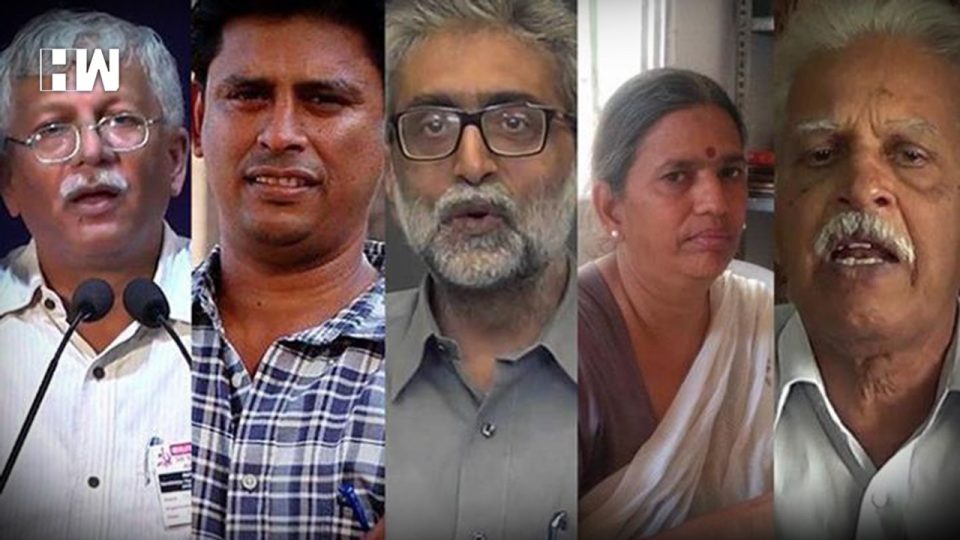New Delhi | The Supreme Court on Friday refused to interfere with the arrest of five rights activists by the Maharashtra Police in connection with the Koregaon-Bhima violence case and declined to appoint a SIT to probe their arrest.
A three-judge bench headed by Chief Justice Dipak Misra, in a 2:1 verdict, refused the plea seeking the immediate release of the activists.
The bench also extended by four weeks the house arrest of the activists. The five activists — Varavara Rao, Arun Ferreira, Vernon Gonsalves, Sudha Bharadwaj and Gautam Navlakha — are under arrest at their homes since August 29.
The majority verdict said accused persons cannot choose which investigating agency should probe the case, and this was not a case of arrest merely because of difference in political views.
Justice A M Khanwilkar read out the majority verdict for himself and the CJI, while Justice D Y Chandrachud said he was unable to agree with the view of the two judges.
Justice Chandrachud, in his judgement dissenting with the majority, said the arrest of the five accused was an attempt by the state to muzzle dissent, and dissent ia s symbol of a vibrant democracy.
The Maharashtra police had arrested the activists on August 28 in connection with an FIR lodged following a conclave — ‘Elgaar Parishad’ — held on December 31 last year that had later triggered violence at Koregaon-Bhima village in the state.
Prominent Telugu poet Rao was arrested on August 28 from Hyderabad, while activists Gonsalves and Ferreira were nabbed from Mumbai, trade union activist Sudha Bharadwaj from Faridabad in Haryana and civil liberties activist Navlakha from Delhi.
The verdict said the protection of house arrest of the activists will remain in force for four more weeks to enable the accused to seek appropriate legal remedy at an appropriate legal forum.
It said arrests were not because of dissent of activists but there was prima facie material to show their link with banned CPI (Maoist) organisation.
The majority verdict disagreed with the PIL by historian Romila Thapar and others seeking the immediate release of five rights activist, with liberty to the accused to seek remedy in appropriate court.
The plea by Thapar, economists Prabhat Patnaik and Devaki Jain, sociology professor Satish Deshpande and human rights lawyer Maja Daruwala, had sought an independent probe into the arrests and the immediate release of the activists.
Justice Khanwilkar refrained from commenting on the merits of the case saying it may prejudice the case of accused and prosecution.
Justice Chandrachud said liberty cherished by the Constitution would have no meaning if persecution of the five activists is allowed without proper investigation.
He said the petition was genuine and lashed out at Maharashtra police for press meet, distribution of letters to media.
Justice Chandrachud said the court should proceed as if personal practices are essential but whether they are derogatory to liberty, dignity enshrined in Fundamental Rights.
He said letters alleged to be written by activist Sudha Bharadwaj were flashed on TV channels. Police selectively disclosing the probe details to media amounts to casting cloud on fair investigation, he said.
Justice Chandrachud was of the opinion that this was a fit case for appointing an Special Investigation Team (SIT). He said there should be monitoring of the SIT probe by the apex court.
He said dissent is the safety valve in the pressure cooker of democracy and it cannot be muzzled by brute force of police.
When investigation appears to be unfair, the top court must step in, he said and cited the case of wrongful arrest of scientist Nambi Narayan in ISRO spy case.
The apex court had on September 19 said it would look into the case with a “hawk’s eye” as “liberty cannot be sacrificed at the altar of conjectures”.
It had told the Maharashtra government that there should be a clear-cut distinction between opposition and dissent on one hand and attempts to create disturbance, law and order problems or overthrow the government on the other.
The court had reserved the judgment on September 20 after counsel for both parties, including senior advocates Abhishek Manu Singhvi, Harish Salve and Additional Solicitor General Tushar Mehta, concluded their submissions.
Senior advocate Anand Grover, Ashwini Kumar and advocate Prashant Bhushan, appearing for the activists, had also alleged that the entire case was cooked up and adequate safeguards should be provided to protect the liberty of the five activists.
The apex court had also said that it may order an SIT probe if it found that the evidence has been “cooked up”.
As an independent media platform, we do not take advertisements from governments and corporate houses. It is you, our readers, who have supported us on our journey to do honest and unbiased journalism. Please contribute, so that we can continue to do the same in future.

